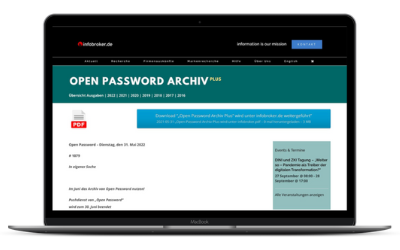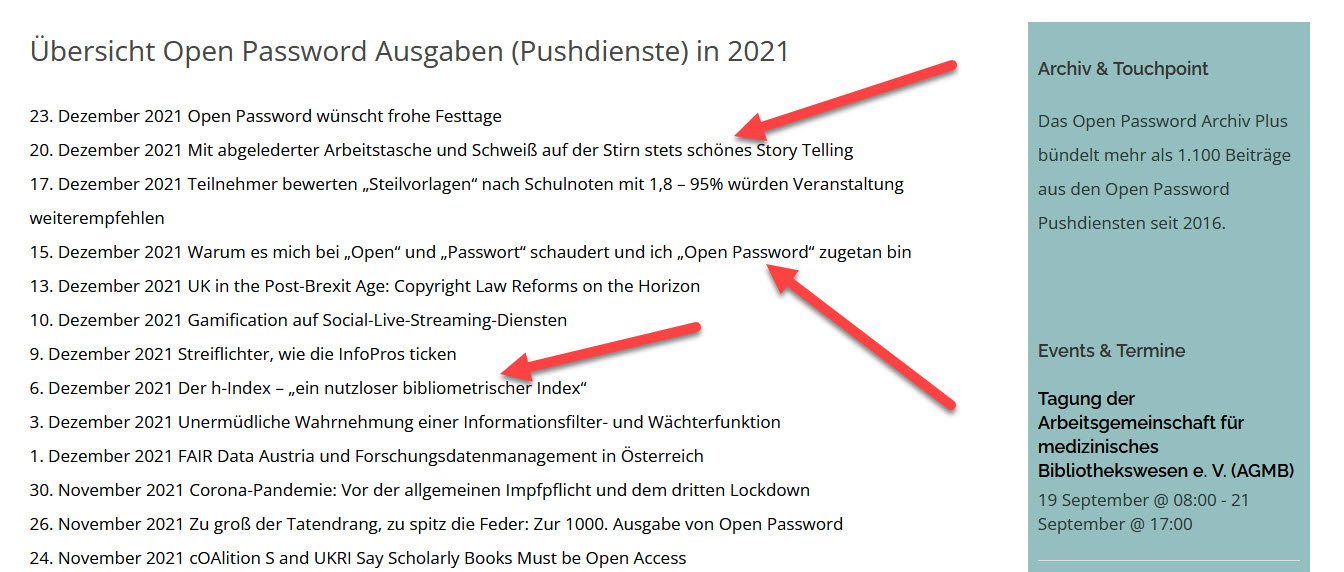Open Password – Dienstag, den 22. September 2020
# 827
Outsell – Apple – Google – Hugh Logue – Epic Games – Fortnite – App Stores – iOS Devices – LG – In-app Purchases – IBM – European Commission – US Congress – Litigation – B2B Content – Keepnet Labs – 2020 Phishing Trend Report – Vulnerable Sectors – E-Mail-based Attacks
Outsell´s September Contribution (2)
An Epic Battle with Apple and Google
Could Benefit the Whole Industry
By Hugh Logue, Director & Lead Analyst
A formidable adversary is challenging the big cut that Apple and Google take from app developers. If successful, the move could increase the bottom line for providers across the industry.
_________________________________________________________________________________
What to Know and Why It Matters
_________________________________________________________________________________
Epic Games, the creator of the popular game Fortnite, is taking legal action against Apple and Google after being banned from both of the tech giants’ app stores. Apple and Google removed Fornite from the App Store and Google Play Store after an update to the game let users bypass the tech giants and buy in-game currency at a lower rate directly from Epic Games. Both Apple and Google take a 30% cut from purchases on their app stores. Minutes after the game’s removal, Epic announced that it had filed a legal complaint.
On Apple iOS devices, the only way to legitimately install apps is to download them via the App Store, and in-app purchases must also go through Apple’s payment system. The Google Play Store is a little more flexible in allowing users to install apps from other locations, but in the court filing, Epic also cites contracts between Google and phone manufacturer LG that prevent Epic Games software from being added directly to LG devices if they bypass the Google Play Store.
The update to Fortnite’s game offered users a 20% discount on its in-game currency if purchased directly from Epic’s website rather than through Apple’s or Google’s payment systems. App Store guidelines prohibit any payment system apart from Apple’s own, which has caused frustration for developers, especially with the rise of in-app purchases in recent years. Epic is alleging that Apple and Google, which control the operating systems of almost all smartphones globally, act like a duopoly by charging excessive fees to list apps and make in-app purchases. Both Apple and Google also decide what apps can be sold through their app stores. Epic is not looking for financial compensation; instead, it is seeking injunctive relief to allow fair competition.
This move is a long-term strategic one by Epic Games, which is also looking to launch competing app stores on mobile devices, a move it made in the PC space through the launch of its successful Epic Games Store. Its store takes a 12% cut from PC game developers, undercutting its direct competitor Steam, which charges 30% like Apple and Google.
Fortnite is one of the world’s most popular games, with more than 350 million registered players, and that could put further pressure on the tech giants. Soon after Epic filed its legal complaint in a California court, it launched a short film entitled “Nineteen EightyFortnite,” a parody of Apple’s famous television ad in 1984, when it was the disrupter taking on then-dominant IBM. In Epic’s legal complaint, the company stated: “Apple has become what it once railed against: the behemoth seeking to control markets, block competition, and stifle innovation.”
In June, the European Commission announced that it had opened a formal antitrust investigation into Apple to determine whether the terms it imposed on app developers were in breach of EU competition rules. In the US, antitrust authorities are investigating Apple, Amazon, Facebook, and Google for their market dominance and control over access to markets.
___________________________________________________________________________
Essential Actions
___________________________________________________________________________
Epic has launched a highly coordinated attack against Apple and Google, provoking both to remove Epic apps from their stores and launching a viral media campaign while simultaneously filing a lawsuit. This comes at a time when the tech giants’ business practices are already under public scrutiny from the US Congress and EU competition authorities.
Whatever happens with the legal case, this is set to be a long, relentless branding headache for Apple, in particular, as the loss of Fortnite makes its phones less desirable to younger audiences. Google will similarly face pressure from phone manufacturers. As the media reports on the case, Epic is likely to follow up with piercing media campaigns and to rally its fans to make these instantly viral. Eventually, Apple and Google will feel the pressure to give up at least some ground as their brands take a hit and competition regulators come under increased pressure to take action or have consumers view them as toothless. This is a masterclass in 21st-century litigation.
The Apple and Google app stores’ cut has long angered information providers. Apple, in particular, has annoyed users, who cannot easily install apps onto iOS devices by other means. Developers must share a 30% cut of in-app fees and cannot promote alternative ways to pay within their products. This has made some products unviable, especially B2B apps and content, which can cost hundreds of dollars, and in the consumer space, where the sales tax added in many countries is not recoverable. The case could also have repercussions for solution providers that provide a similar platform model as Apple and Google, especially if there are only a few or no alternatives.
The removal of the 30% cut could open up new possibilities and opportunities by making it easier for providers to get a return on investment for their development work. Affected providers must now consult with their communities and consider submitting requests to file amicus briefs supporting Epic Games by providing the court with information and evidence about how Apple and Google’s policies negatively impact their businesses.
Keepnet Labs
The 2020 Phishing Trend Report
1 out of 8 people share the information
requested by attackers
Cyber attacks cause great harm to the business world due to their evolving nature and it is expected that cyber attacks will cost businesses 6 trillion dollars worldwide next year. Keepnet Labs reveals its latest research on the most vulnerable sectors and internal departments affected by cyber attacks.
While cyber attackers chase down system vulnerabilities and valuable data each passing day, the business world has taken the measures against them. The latest trends and cybersecurity statistics reveal that data from various sources, especially mobile and IoT devices, is targeted and attacked. Organizations face the risk of data loss due to unprotected data and weak cyber security practices.
In the first half of last year, $ 4.1 billion of data records were exposed [1], while the average time needed to detect a leak was 206 days [2]. While the average loss caused by a data leak is estimated at $ 3.92 million[3] for businesses, cyberattacks will create $ 6 trillion[4] in losses globally in the next year.
Keepnet Labs, a UK-based cyber security awareness and anti phishing company, has revealed the most vulnerable departments and sectors against phishing attacks. The Keepnet Labs 2020 Phishing Trends Report was generated by a data set of 410 thousand phishing emails, covering a period of one year.
Accordingly, 90% of successful cyber attacks occur through email-based attacks. These cyberattacks use deceptive, deceptive and fraudulent social engineering techniques, especially to bypass various security mechanisms / controls.
___________________________________________________________________________
1 out of 8 people share the information requested by attackers
___________________________________________________________________________
According to the Report, which identifies the sectors and departments that are most vulnerable to phishing attacks:
- 1 out of 2 employees opens and reads phishing emails.
- 1 out of 3 employees clicks links or opens file attachments in phishing emails (which may cause silent installation of malware / ransomware).
- 1 out of every 8 employees shares the information requested in phishing emails.
Moreover, the sectors and departments most vulnerable to cyber attacks are identified in the Report.
___________________________________________________________________________
Sectors most vulnerable to cyber attacks
___________________________________________________________________________
Top 5 sectors with the highest click rates on malicious links in phishing emails:
- Consulting (63%)
- Clothing and Accessories (48%)
- Education (47%)
- Technology (40%)
- Holdings / Conglomerates (32.37%)
___________________________________________________________________________
Sectors with the highest rates of data sharing
___________________________________________________________________________
- Clothing and Accessories (43%)
- Consulting (30%)
- Securities and Stock Exchange (23%)
- Education (22%)
___________________________________________________________________________
Corporate departments most affected by cyber attacks
___________________________________________________________________________
The top three departments with the highest rates of clicking fake links in phishing emails:
- Law / Audit / Internal Control (59%)
- Procurement / Administrative Affairs (58%)
- Quality Management / Health (56%)
While the findings reveal that these departments have not changed according to last year’s statistics, the Report concludes that most of the sensitive information needed by cybercriminals is accessible via users working in these vulnerable units. This in turn poses a serious threat to their respective organizations, because employees with such privileged access to this prized information are the key people in those organisations who motivate the hackers to infiltrate organizations and execute their intended, malicious campaigns
___________________________________________________________________________
The top three departments with the highest rates of sharing data
___________________________________________________________________________
- Quality Management / Health (27%)
- Procurement / Administrative Affairs (26%)
- Legal / Audit / Internal Control (25%)
These statistics reveal that certain departments are more inclined to share sensitive information compared to others, and considering their position, they should be much more careful against cyber attacks.
Sources: 1 RiskBased 2 IBM 3 Security Intelligence 4 C. Ventures
Open Password
Forum und Nachrichten
für die Informationsbranche
im deutschsprachigen Raum
Neue Ausgaben von Open Password erscheinen viermal in der Woche.
Wer den E-Mai-Service kostenfrei abonnieren möchte – bitte unter www.password-online.de eintragen.
Die aktuelle Ausgabe von Open Password ist unmittelbar nach ihrem Erscheinen im Web abzurufen. www.password-online.de/archiv. Das gilt auch für alle früher erschienenen Ausgaben.
International Co-operation Partner:
Outsell (London)
Business Industry Information Association/BIIA (Hongkong)
Anzeige

FAQ + Hilfe



